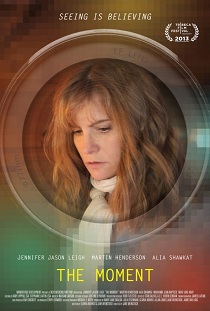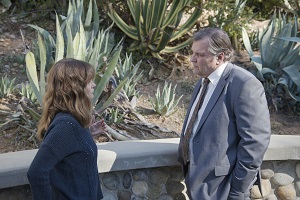 A very interesting movie with strong performances, methodical pacing, and a decidedly creative streak running through its core, The Moment is somewhat hampered by the structure of its foundation. The story of a traumatized war photographer who is struggling to piece together the last couple months of her life, the film can be simultaneously thrilling and maddening, for it tracks a woman who has suffered a serious psychological break, and is hallucinating and dealing with a host of other delusions. Intriguing at times, it can also be frightfully confusing, for director and co-writer Jane Weinstock keeps the film rooted in her main character: a woman who can’t even be relied upon to convey accurate visual information.
A very interesting movie with strong performances, methodical pacing, and a decidedly creative streak running through its core, The Moment is somewhat hampered by the structure of its foundation. The story of a traumatized war photographer who is struggling to piece together the last couple months of her life, the film can be simultaneously thrilling and maddening, for it tracks a woman who has suffered a serious psychological break, and is hallucinating and dealing with a host of other delusions. Intriguing at times, it can also be frightfully confusing, for director and co-writer Jane Weinstock keeps the film rooted in her main character: a woman who can’t even be relied upon to convey accurate visual information.
Thus the audience is set loose in a world where images suddenly mutate and transform from moment to moment, and flashbacks that cover the same interaction change to something different nearly every time it is recalled. At the center of all this is Lee (Jennifer Jason Leigh), the physically and emotionally scarred war correspondent who starts the film at a man’s house, presumably an ex- of some sort, to pick up some camera equipment. She’s promptly freaked out by the M.I.A. state of her lover’s residence, and reports the man’s disappearance to the police, who seem far more interested in Lee than the incident she’s come to them about.
It’s a curious scene, and sets up the sort of off-kilter tone of the film, for while Lee is the audience’s guide throughout this drama, it’s clear right from the get-go that she can’t be trusted. This inclination is confirmed within a few minutes of the movie’s opening, for during an art exhibition, Lee mysteriously emerges from a bathroom buck-ass-naked, and is promptly whisked away to a mental institution for a serious round of head-shrinking. While at this institution Lee begins therapy sessions, and slowly starts to peel away at the psychological scabs that have begun to harden around the last few months of her life.
 The events leading up to Lee’s committal are shown in flashback, yet with the same visual obfuscation mentioned above. During one of these flashbacks the audience learns that Lee was injured on assignment not long ago, and had been recovering in a physical rehabilitation center when she met a fellow patient, John (Martin Henderson). It turns out this John guy is the missing dude from the beginning of the movie, and he seems to be an important component in unraveling the secrets behind Lee’s recent “break.”
The events leading up to Lee’s committal are shown in flashback, yet with the same visual obfuscation mentioned above. During one of these flashbacks the audience learns that Lee was injured on assignment not long ago, and had been recovering in a physical rehabilitation center when she met a fellow patient, John (Martin Henderson). It turns out this John guy is the missing dude from the beginning of the movie, and he seems to be an important component in unraveling the secrets behind Lee’s recent “break.”
Marianne Jean-Baptiste plays Lee’s psychiatrist, and acts as something of a thematic lighthouse for the audience. It’s hard to know exactly what has happened to Lee, or how much we should fear for her, yet this psychiatrist and her responses seem to nudge things along and keep the audience grounded. It’s a wonderful performance, and may seem disproportionately so because of the uncertain nature of pretty much every character around her. As stated before, one of the things that The Moment seems to be going for is an off-balance vibe: one where the audience can’t fully get comfortable lest they’re thrown by the next hallucination reveal.
 This works very well, yet is so effective that it keeps a viewer from becoming too invested in any particular character, with the possible exception of the psychiatrist. Lee is a bag full of crazy, John isn’t shown to be that much better, and Lee’s daughter (played to perfection by Alia Shawkat) is alternately a saint and villain depending on the blink-and-you-missed-it reveals the movie tosses out every couple of minutes. Once all the characters are put on the table, it’s hard to know exactly which way to lean or what to root for, as the dynamics of each relationship and one’s understanding of it change so frequently.
This works very well, yet is so effective that it keeps a viewer from becoming too invested in any particular character, with the possible exception of the psychiatrist. Lee is a bag full of crazy, John isn’t shown to be that much better, and Lee’s daughter (played to perfection by Alia Shawkat) is alternately a saint and villain depending on the blink-and-you-missed-it reveals the movie tosses out every couple of minutes. Once all the characters are put on the table, it’s hard to know exactly which way to lean or what to root for, as the dynamics of each relationship and one’s understanding of it change so frequently.
Though a credit to Marianne Jean-Baptiste, it’s hardly a boon to The Moment, which becomes so needlessly convoluted by the end that even if a person does fully understand everything that happened (and is happening), they probably don’t care. So much time is spent unraveling the details of Lee and John’s mystery that any pretense about character development or growth is thrown out the window. Again, credit should be given to the actors for pulling most of this off, and presenting believable portraits of people hacking through this madness, yet even their good work can’t elevate this above the mostly mundane material.
 Still, credit should be given to Jane Weinstock for tackling her story in such an audacious manner. Keeping the film’s P.O.V. trained on the half-mad Lee serves what appears to be the intended purpose (keeping the audience guessing and off-balance), yet as stated before, it works a bit too well at times. Some of the camera and shot choices fall into a similar trap, for the unfocused moments and uncomfortably close close-ups certainly evoke a tangible sense of anxiousness, yet invariably seep into the overall flavor of the film.
Still, credit should be given to Jane Weinstock for tackling her story in such an audacious manner. Keeping the film’s P.O.V. trained on the half-mad Lee serves what appears to be the intended purpose (keeping the audience guessing and off-balance), yet as stated before, it works a bit too well at times. Some of the camera and shot choices fall into a similar trap, for the unfocused moments and uncomfortably close close-ups certainly evoke a tangible sense of anxiousness, yet invariably seep into the overall flavor of the film.
One of the last films to show at this year’s Seattle International Film Festival, The Moment might be worth seeing for anybody with a background in mental health, yet for everyone else, it just might make you feel a bit…well, crazy.





Comments on this entry are closed.